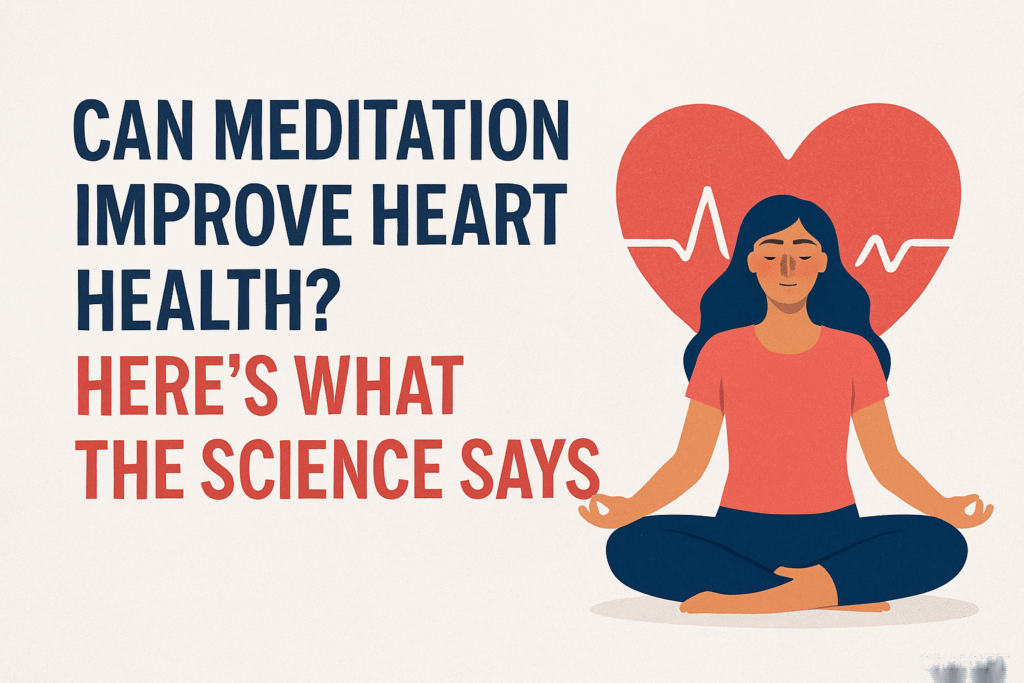Heart health is one of the most important aspects of overall well-being. With rising stress levels, unhealthy lifestyles, and genetic predispositions, cardiovascular diseases are increasingly common. While conventional treatments like medications, diet, and exercise are essential, recent research suggests that meditation may also play a beneficial role in maintaining heart health. But how exactly can meditation affect the heart, and what does science say about it?
Understanding Meditation and Its Benefits
Meditation is a practice that involves focusing the mind and achieving a state of calm and mental clarity. It can take many forms, including mindfulness meditation, transcendental meditation, guided imagery, and breathing exercises. Regular meditation is associated with reduced stress, improved concentration, and enhanced emotional well-being.
Stress is a major contributor to heart problems. Chronic stress can lead to increased blood pressure, higher heart rate, and inflammation—all factors that elevate the risk of heart disease. By promoting relaxation and lowering stress, meditation helps mitigate these risk factors.
Scientific Evidence Linking Meditation and Heart Health
Several studies have explored the effects of meditation on cardiovascular health. Research has shown that people who meditate regularly tend to have lower blood pressure, reduced cholesterol levels, and improved heart rate variability. These benefits collectively reduce the risk of heart attacks, strokes, and other cardiovascular events.
For instance, a study published in the journal Circulation highlighted that patients with coronary heart disease who practiced meditation experienced a significant reduction in risk factors such as high blood pressure and anxiety. Another study demonstrated that meditation can improve endothelial function, which is crucial for maintaining healthy blood vessels.
How Meditation Supports Heart Health
-
Lowering Blood Pressure:
High blood pressure, or hypertension, is a leading risk factor for heart disease. Meditation helps activate the parasympathetic nervous system, which promotes relaxation and reduces the “fight or flight” response that elevates blood pressure.
-
Reducing Stress Hormones:
Cortisol, the primary stress hormone, can negatively impact heart health when chronically elevated. Meditation helps regulate cortisol levels, decreasing the harmful effects of stress on the cardiovascular system.
-
Improving Heart Rate Variability:
Heart rate variability (HRV) is a measure of the variation in time between heartbeats. Higher HRV indicates a healthy heart and better adaptability to stress. Meditation has been shown to improve HRV, thereby enhancing overall cardiovascular resilience.
-
Promoting Better Lifestyle Choices:
People who meditate regularly are often more mindful of their health. They tend to adopt healthier eating habits, exercise more, and avoid harmful behaviors like smoking—all of which contribute to better heart health.
Meditation as a Complementary Approach
While meditation offers many benefits, it should not replace conventional treatments for heart disease. Medications, regular exercise, and a heart-healthy diet remain the cornerstone of cardiovascular care. However, meditation can be a valuable complementary practice, enhancing the effectiveness of traditional therapies.
Dr Tanmay Kulkarni, a renowned Cardiologist in Pune, emphasizes that incorporating meditation into daily routines can help patients manage stress, maintain better heart function, and improve overall well-being. As a Heart specialist in Pune, he often recommends mindfulness practices alongside medical treatment for patients at risk of cardiovascular issues.
Practical Tips to Start Meditation for Heart Health
-
Start Small:
Begin with just 5–10 minutes per day and gradually increase the duration as you become more comfortable.
-
Choose Your Style:
Experiment with different meditation styles, such as mindfulness, breathing exercises, or guided meditation, to find what works best for you.
-
Consistency Matters:
Like any health practice, meditation is most effective when done consistently. Aim for daily practice, even if it’s short.
-
Create a Calm Space:
Find a quiet, comfortable space where you can meditate without distractions.
-
Focus on Breathing:
Simple deep breathing exercises can reduce stress and promote relaxation, even for beginners.
The Role of a Cardiologist in Supporting Meditation Practices
A Cardiologist in Baner can help integrate meditation into a comprehensive heart health plan. They can assess your risk factors, monitor your blood pressure, and provide guidance on combining meditation with lifestyle modifications and medications. Collaborating with a medical professional ensures that meditation complements, rather than replaces, standard cardiac care.
Conclusion
Meditation is more than just a mental wellness practice; it has tangible benefits for heart health. By reducing stress, lowering blood pressure, improving heart rate variability, and encouraging healthier lifestyle choices, meditation can play a meaningful role in cardiovascular care. While it should not replace conventional medical treatment, it is a safe and effective complementary practice for anyone seeking to protect their heart.
Dr Tanmay Kulkarni, a leading Cardiologist in Pune, encourages patients to explore meditation alongside professional care. With consistency and guidance, meditation can contribute to a healthier heart, reduced stress, and improved overall quality of life.
📞 Book an Appointment: 8551913753
🌐 Visit Our Website: www.drtanmaykulkarni.com


 Select an element to maximize. Press ESC to cancel.
Select an element to maximize. Press ESC to cancel.